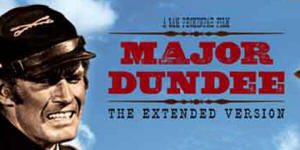Making movies. Enjoying movies. Remembering movies.
THE SCREENING ROOM
Related Articles:
|
By
Rick Mitchell

American film history is littered with
stories of films ruined by the insensitivity of untalented producers
and/or ignorant studio executives. In some instances, it has been
possible to restore them to a facsimile of their director's intent, such
as Rick Schmidlin's reconstruction of Orson Welles' "Touch Of Evil" or
Richard Schickel's recent superb reconstruction of Samuel Fuller's "The
Big Red One."
In the case of Sam Peckinpah's "Major Dundee," though the work print of
the director's original 160-minute cut apparently was not preserved, nor
were any negative outs after that was cut, apparently a 136-minute
version was dubbed, negative cut, and had protective separations made
before being recut down to the 124 minute version released in 1965.
Grover Crisp's discovery of these separations and this track became the
foundation of the just released "Extended Version."
The additional 12 minutes enrich the film very much and leave one
further lamenting the loss of the original cut. Like his predecessors
Ford, Hawks, Hitchcock, Stevens, et. al., Peckinpah was basically a
storyteller, one who could easily adapt the story he wanted to tell to
the form in which he wanted to tell it, in this case the predominately
visual medium of film. Thus, much of the essence of Peckinpah is not as
much in his choice of words, but in his selection of images: the bits of
character illuminating business, the looks characters exchange, or that
he shows the audience but not other characters, etc. This is pure cinema
and because it takes time, it's the time of thing that's often quickest
to get cut, particularly by insensitive executives who get bored with
such things after seeing a film numerous times and forgetting that they
may be fresh and illuminating for audiences seeing the film for the
first time. (As an editor, that's the type of thing I look for to help
make bring a scene to life, and fight to keep (most often successfully,
I'm proud to say) when producers want to cut them.
In "Major Dundee: The Extended Version," the additional 12 minutes are
spread throughout the film, further focusing the animosity between the
Union soldiers and Confederate prisoners as well as the wounded Dundee's
previously badly cut "dark night of his soul" in the Mexican village,
though this cut also appears to have been something of a compromise.
This may still be the version of Jerry Bresler, by all accounts the kind
of no-talent hack Selznick/Thalberg wannabee that gives a bad name among
creative people, but it's also closer to Peckinpah's intent.
As to the controversial new score by Christopher Caliendo, it is
actually quite good, more along the lines of the type of western scores
that were being done in the mid-Sixties (after Bernstein, before
Morricone) with a Mexican flavor. Those overly familiar with the
original score may have trouble accepting it at first, but it's not as
bad as Allied Artists' replacing Richard La Salle's score for "Blood On
The Arrow" (1965) with cues from Andre Previn's score for the
contemporary thriller "Dead Ringer." And for Ben Burtt and other sound
effects geeks, the original Columbia gunshots, body falls, horse
whinny's, and other familiar effects have been retained in this
excellent Dolby Digital 5.1 redub.
Rick Mitchell is a film editor, film director, and film historian. He lives in Los Angeles.
© 2005 Rick Mitchell. All rights reserved
